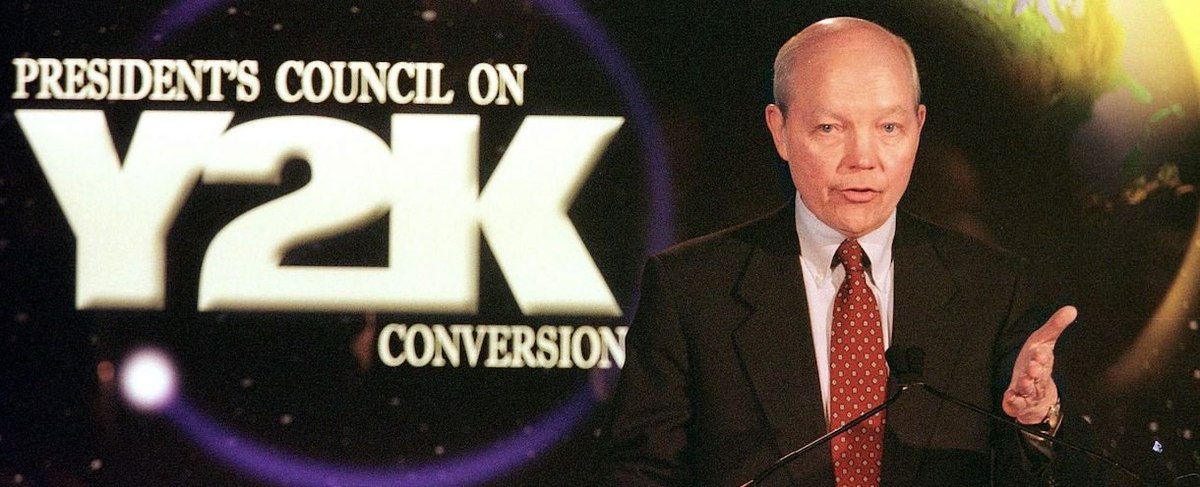In the lead-up to the year 2000, many people anticipated that the turn of the century (or thereabouts) would coincide with major issues arising from the way dates were formatted in computer systems at the time — an issue known as the Y2K problem. A recent YouGov survey asked Americans who are now 30 and older — those who were at least 5 in 1999 — their views of the problem, both at the time and in retrospect.
While nearly all remember being aware of the Y2K problem and a majority recall most other people being concerned about it, few say they personally were very worried about it, and few believe it caused major disruptions. In the debate over whether Y2K disruptions were ultimately avoided due to effective management or because the problem was exaggerated to begin with, most Americans take the latter stance. But despite believing time and resources were wasted, more approve than disapprove of how the Y2K problem was handled by companies and the government at the time.
Memories of the Y2K problem
Since 1999, the shares of Americans 18 and older who have a computer in their household — and who say they often use one — have increased significantly. The frequency of encountering computer problems, however, appears to have declined: 15% say they very or somewhat often have computer problems today, compared to 34% of people who were 18 and older in 1999 and say they did at the time.
Among the most infamous computer problems of the era was the Y2K problem. Most Americans who were at least 5 at the time remember hearing about the Y2K problem in the period leading up to the year 2000: 47% recall hearing a lot about it and 33% a fair amount.
Two-thirds of people 30 and older (71%) say that in 1999, someone in their household owned a computer. People who owned a computer at the time, or frequently used one, are more likely than those who didn't to say they remember hearing a lot about the Y2K problem.
Concern and preparation
While most Americans 30 and older remember hearing about the Y2K problem, just one in three (32%) say that at the time they were very or somewhat concerned about it. Far more — 72% — remember most other people being very or somewhat concerned.
Most Americans 30 and older didn't or don't remember their family taking any steps to prepare for the Y2K problem. One in four (25%) say they educated themselves on the problem and 18% updated their computer. Fewer remember withdrawing cash (9%), checking their appliances (7%), or stockpiling supplies (7%). People who say they were concerned about the problem are more likely to have taken each of the preparatory steps asked about in the poll.
The aftermath
Today, just 4% of Americans 30 and older say the Y2K problem ultimately caused major disruptions to the country; 29% say it caused minor disruptions, and 52% say it didn't cause any. People who say they were concerned about the problem are more likely to say it caused some disruption.
In December 1999, a survey by the Associated Press similarly found that just 5% of Americans expected Y2K to cause major problems; however, 69% expected at least minor problems (compared to 29% in our recent poll who say Y2K caused minor disruption) and 23% thought there would be no problems (vs. 52% who say today it caused no disruptions).
A majority of Americans 30 and older (57%) say that looking back, people expressed too much concern about the Y2K problem in the period leading up to the year 2000; 25% say people expressed the right amount of concern, and 4% say too little concern was expressed. People who remember others being very concerned about the problem are especially likely to say Americans in general were too concerned (63%).
In retrospect, far more Americans 30 and older classify the Y2K problem as "an exaggerated problem that wasted time and resources" (68%) than as "a serious problem which was effectively managed" (14%). One in five (18%) are unsure. People who say they were personally very or somewhat concerned about Y2K are more likely than those who say they were not very or not at all concerned to say the problem was effectively managed (25% vs. 9%). Both groups nonetheless are much more likely to say Y2K was an exaggerated problem that wasted time and resources.
Despite many feeling as if time and resources were wasted on Y2K preparation, Americans are more likely than not to approve of how various entities handled the problem. Slightly more positively evaluate the job done by computer companies and banks than do so about the government, Congress, President Bill Clinton, or Vice President Al Gore.
— Carl Bialik contributed to this article
See the results for this YouGov poll
Methodology: This poll was conducted online on January 11 - 28, 2024 among 1,000 U.S. adult citizens. Respondents were selected from YouGov’s opt-in panel using sample matching. A random sample (stratified by gender, age, race, education, geographic region, and voter registration) was selected from the 2019 American Community Survey. The sample was weighted according to gender, age, race, education, 2020 election turnout and presidential vote, baseline party identification, and current voter registration status. Demographic weighting targets come from the 2019 American Community Survey. Baseline party identification is the respondent’s most recent answer given prior to November 1, 2022, and is weighted to the estimated distribution at that time (33% Democratic, 31% Republican). The margin of error for the overall sample is approximately 4%.
Image: Getty












